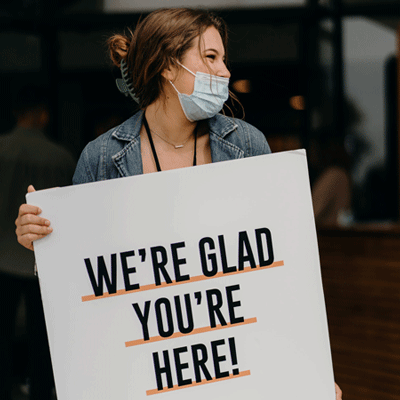The Office of Gender, Racial & Intercultural Justice will be offering frequent virtual gatherings on making radical welcome real
June 18, 2023

Samantha Davis helped present the Disparities Experienced by Black Women and Girls task force report. (Photo by Rich Copley)
Radical welcome, defined as “the spiritual practice of embracing and being changed by the gifts, presence, voices and power of The Other: the people systemically cast out or marginalized within a church, denomination and/or society,” was the focus of a recent webinar put on by the Presbyterian Mission Agency’s Office of Gender, Racial & Intercultural Justice. Watch the hourlong webinar hosted by Samantha Davis, Associate for Gender, Racial & Intercultural Justice, by going here.
The Rev. Shanea Leonard, director of Racial Equity & Women’s Intercultural Ministries, cited that definition for radical welcome from Stephanie Spellers’ book “Radical Welcome: Embracing God, the Other and the Spirit of Transformation.” Read more about radical welcome, including scriptural references, in the “8 Habits of Evangelism” resource here.
For Leonard, extending radical welcome “reminds us of Christ’s mandate to go to all the world, to be salt and light and represent Christ to those who have often felt marginalized in places of faith and worship.”
The first step, Davis said, is to let go of the mindset of “us vs. them.”
“We say, ‘What about my culture? What about my beliefs?’ There is value in embracing the differences among all of us,” Davis said. “It’s not a scarcity perspective — in fact, there is room for all of us to be in Christ, to be affirmed and welcomed together.”
It’s also important to replace the fear of the unknown with the excitement of what might be, Davis said. “What’s possible once we push past our discomfort, the harm we have caused? What beauty, what change is possible beyond that?”
The third step, according to Davis, is to learn about one another and “shift the narrative to create a platform that incorporates the culture, identity and sense of self into the life of the community.” When Davis asked webinar participants if they had any experience with that, one said, “We have started a midweek worship service to reach out to the marginalized in our area.” Another identified fear of the unknown as the most difficult hurdle for extending radical welcome. “I am in a small town,” this person said. “Some members of the church are for it, and some are against it. Others are for it, but afraid people will leave the church. We aren’t considering who we might gain.”
 Ahead of the webinar, Davis asked social media followers if the church had ever harmed them. Within 24 hours, she’d received more than 50 replies. Webinar participants read some of their stories out loud, including that of a person diagnosed with a heart condition at age 9. The person’s mother went from church to church, seeking healing. “The pastors tried to pray the demons of illness out of me,” this person reported.
Ahead of the webinar, Davis asked social media followers if the church had ever harmed them. Within 24 hours, she’d received more than 50 replies. Webinar participants read some of their stories out loud, including that of a person diagnosed with a heart condition at age 9. The person’s mother went from church to church, seeking healing. “The pastors tried to pray the demons of illness out of me,” this person reported.
“They convinced me to trust them as a teen mom,” said another, “then threw me away as an adult mom.”
“How has the church caused harm and othered?” Davis wondered, listing some of the ways that occurs: racism, patriarchy, ableism, oppression, queerphobia and ageism. “The ugly truth we need to sit with is the church perpetuates this harm,” Davis said. “Our job is to acknowledge it, address it and create space for people.”
Asked what was resonating with them, participants identified thoughts including “We need to tell the truth, acknowledge and learn our history,” “Where do we go from here?” “We say LGBTQ people are welcome, but we aren’t taking steps to make sure they are.”
Start with the low-hanging fruit, Davis suggested. Incorporate people’s pronouns during meetings and gatherings “to assure people feel affirmed.”
Make radical welcome “as tangible as possible, so you don’t feel you are climbing Mount Everest,” Davis said, “just chipping at the layers one by one.”
“It’s not our differences that divide us,” Davis said, quoting author Audrey Lorde. “It is our inability to recognize, accept and celebrate those differences.”
“God calls us to love and create welcoming, affirming spaces,” Davis said. “It lets marginalized people know they are in a community of people who want you to feel safe.”
Mike Ferguson, Editor, Presbyterian News Service
Revised Common Lectionary Readings for Sunday, June 18, 2023, the Eleventh Sunday in Ordinary Time (Year A)
Today’s Focus: Office of Gender, Racial & Intercultural Justice
Let us join in prayer for:
PC(USA) Agencies’ Staff
Jennifer Evans, Communications/National Partnerships, Presbyterian Hunger Program, Presbyterian Mission Agency
Mari Evans, Digital Strategy Manager, Communications, Presbyterian Mission Agency
Let us pray
God of compassion, your people are hurting. Your creation is ailing. Cities are crumbling. Schools are struggling. We need your help. Bring healing where there is brokenness, hope where there is despair, action where there is resignation. Send us out into the streets, to be agents of your love and your justice in all that we do. Amen.